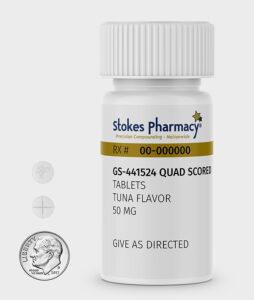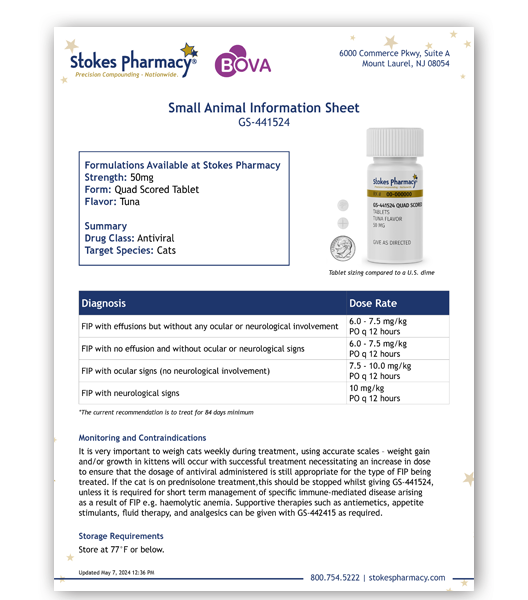Feline Infectious Peritonitis (FIP) is a disease that continues to perplex and challenge veterinary professionals worldwide. With no legal access to treatment for veterinarians in the U.S., FIP was often seen as a death sentence for cats. However, recent advancements in antiviral therapy have shown that effective treatment for Feline Infectious Peritonitis (FIP) is now a reality.
The following information was written by Dr. Stephanie Sorrell, Prof. Séverine Tasker, Dr. Sam Taylor, Dr. Emi Barker, and Prof. Danielle Gunn-Moore
FIP is a severe disease in cats caused by feline coronavirus. COVID-19 is also caused by a coronavirus but the coronavirus causing FIP is not the same and only infects cats. Feline coronavirus is commonly found in the feces of cats and research has shown that infection is very common among cats. Thankfully, in most, it causes mild diarrhea or no signs at all. However, in a small number of cats, the virus changes (mutates) inside the cat, and interacts with the cat’s immune system in a certain way, resulting in FIP. Finding coronavirus in a cat doesn’t mean they have FIP, and it is not possible to consistently tell the difference between a coronavirus causing FIP, and one causing no signs of illness. Further tests must be performed by a veterinarian to diagnose FIP.
We do not know why certain cats develop FIP and others do not, but it is diagnosed more often in:
Cats with FIP can show a variety of signs as the disease can affect any organ in the body. The most common signs are:
Additionally, the disease can cause fluid to accumulate in the abdomen/belly, chest and occasionally around the heart (so called ‘wet’ FIP) so owners may notice a swollen, rounded belly or the cat may have difficulty breathing. The non-effusive (‘dry’) form can affect any organ including the intestines, lymph nodes, brain, kidneys and eyes. Many cats have a combination of ‘wet’ and ‘dry’ forms of FIP and some cats have pale, slightly yellow gums.
If the brain or spinal cord (neurological FIP) is affected cats will show signs such as fits, an abnormal way of walking (wobbly gait), changes in behavior or trembling for example.
If the eyes are affected (ocular FIP) they may look cloudy, bloody or with different pupil sizes, and the cat may show signs of pain such as holding the eye or eyes closed.

When fluid develops in a body cavity - especially the abdomen and/or chest

When no fluid forms

Affecting the brain and/or spinal cord

Affecting the eyes
In the past, there was no effective treatment for FIP but thankfully times have changed and there are antiviral medications available with good results in treating FIP. These drugs are legally available in many countries and have been shown to be safe and effective (through clinical studies), although they can be expensive.
Current recommendations are to treat for 12 weeks to allow full clearance of the disease. This can seem a long time but gives cats the best chance of recovery. It may be that shorter courses can be recommended in the future but for now 12 weeks of treatment is required. Different types of FIP require different amounts (dosages) of antiviral medication, FIP cats showing neurological and/or ocular signs being treated with higher dosages. However, there is variation in how cats respond, and adjustments may be needed during the treatment period. If a cat is not responding as expected, the amount of antiviral medication may need to be increased.

Stokes Pharmacy has formed an exclusive partnership with the Bova group to offer a U.S.-made oral treatment for FIP. This treatment is supported by Bova’s unique drug formula, which has been utilized in clinical research studies across the globe and is currently in use in the UK and Australia.

FDA’s Center for Veterinary Medicine (CVM) has notified veterinarians that compounded GS-441524 falls under Guidance For Industry (GFI) #256 and is allowed to be compounded and legally prescribed. Read the CVM’s statement here.
GS-441524 was nominated and is now on the GFI under review list for the animal drug bulk substances list in regards to GFI #256 office use. This means that GS-441524 50 mg tablets can be sold to hospitals for office use in all states except Arkansas, Maine, Massachusetts, New Mexico, New York, Oregon, Rhode Island and West Virginia. Veterinarians who work in a state that does not allow USP compounded medications for office use can prescribe the drug in a patient’s name.

10 tablets = $195.00
20 tablets = $325.00
40 tablets = $546.00
These prices do not include shipping + tax when applicable. Our standard 1-2 day shipping is $9.50. Overnight shipping is available upon request of pet owner.
Note: one tablet can be quartered for multiple strengths. Cost of full duration of treatment will vary based on weight changes during treatment and course of treatment. Refer to our GS-441524 dosing calculator below.
Prices subject to change.
Veterinary office orders are ready to ship same day with 1-2 business days in transit. Patient prescriptions will ship once we confirm pet owner payment and shipping information. Then it will be 1-2 business days in transit. Overnight shipping is also available upon request.
Currently, we do not ship internationally. However, Bova Global may be able to assist you.
Outcomes from treatment with GS-441524 as a sole oral treatment are comparable (complete response in 90%+) with combined treatment of remdesivir and GS-441524 or remdesivir alone (Taylor et al, 2023)
6 months from when they are made but realistically less than this. Our iFill DTO system will have dating of the current lot in stock so when offices place an order, they can take this into consideration.
No, we have the tested formulation from Bova that Bova helped us test. We are not making GS-441524 in any other form other than the 50 mg tablets. Please see what could potentially happen when you use a non-tested form of the medication – https://www.stokespharmacy.com/wp-content/uploads/2024/05/Handout-JAVMA-April-2024-Study.pdf
An FDA registered facility.
No one knows what is in the black market drugs as they are unknown, untested drugs made following no regulations. The Stokes Pharmacy product is tested against a proven standard and compounded by a leading regulated nationwide compounding pharmacy.
Your clients should be under the care of a licensed veterinarian to guide them through their FIP journey. Like other antivirals GS-441524 should be prescribed by a veterinarian for reasons that include the risk of antimicrobial resistance. Stokes Pharmacy is a leading regulated nationwide compounding pharmacy that is selling the only oral formula identical to the Bova formula used in clinical studies across the globe. Stokes Pharmacy’s GS-441524 Tablets were tested by Bova to meet their exact specifications. Read a clinical study on black market drugs.
More information about our GS-441524 formulation can be found via our FAQ sheet and our drug information sheet. There are also numerous studies and upcoming webinars featured on this page.
All webinars will be recorded and available to watch on-demand. However, CE credits will only be issued to those who tune in live. Limited Seats! Reserve your spot today!
Explore key historical and clinical abnormalities, significant clues and key findings, and how to leverage physical examinations and practical, affordable tests to narrow down potential diagnoses
Get up-to-date information on treatment and monitoring protocols for FIP that are being routinely utilized in Australia, the UK and Japan.
This webinar focuses on correcting common misconceptions surrounding newly available antiviral therapy for FIP, responding to frequently asked questions, and providing insights from FIP therapy research.

© Stokes Healthcare/Bova 2024

© Stokes Healthcare/Bova 2024

FIP Using Antiviral Drugs in 2024
Published May 2024
The Numbers Are In, What’s New & Dr. Sally’s Updated Treatment Protocols
Published February 2024
Published April 2024
Unlicensed antiviral products used for the at-home treatment of feline infectious peritonitis contain GS-441524 at significantly different amounts than advertised
Published June 2023
Thirty-two cats with effusive or non-effusive feline infectious peritonitis treated with a combination of remdesivir and GS-441524
Published April 2024
Retrospective study and outcome of 307 cats with FIP treated with legally sourced veterinary compounded preparations of remdesivir and GS-441524
Published 2023
Feline Infectious Peritonitis: European Advisory Board on Cat Diseases Guidelines
Published June 2023
Outcomes of treatment of cats with feline infectious peritonitis using parenterally administered remdesivir, with or without transition to orally administered GS-441524

Become a subscriber to get all the latest updates from Stokes and Epicur about FIP news, webinars, medications, and more!
Complete the form below to access the free on-demand webinar.
Complete the form below to access the free on-demand webinar.
Complete the form below to access the free on-demand webinar.
Complete the form below to access the free on-demand webinar.
Our website uses cookies to enhance your browsing experience. By clicking “Accept” you are agreeing to our use of cookies. Learn more in our Privacy Policy.
If you select “Decline” we will respect your privacy, though your browsing experience may be limited.